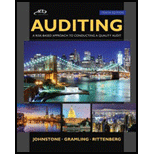
Auditing: A Risk Based-Approach to Conducting a Quality Audit
10th Edition
ISBN: 9781305080577
Author: Karla M Johnstone, Audrey A. Gramling, Larry E. Rittenberg
Publisher: South-Western College Pub
expand_more
expand_more
format_list_bulleted
Question
Chapter 4, Problem 32RSCQ
To determine
Legal Tests
Legal tests are various types of test which are commonly applied the method of evaluation used to resolve the matter of jurisprudence.
To explain: The tests used by courts to determine third party users who can file suit against an auditor for negligence and describe the parties that are defined in these tests.
Expert Solution & Answer
Want to see the full answer?
Check out a sample textbook solution
Students have asked these similar questions
What is the beginning raw materials inventory? Accounting.
Determine the correct inventory amount to be reported in Kwok's 2018 balance sheet.
Solve asap. General Accounting.
Chapter 4 Solutions
Auditing: A Risk Based-Approach to Conducting a Quality Audit
Ch. 4 - Prob. 1TFQCh. 4 - Prob. 2TFQCh. 4 - Prob. 3TFQCh. 4 - Prob. 4TFQCh. 4 - Prob. 5TFQCh. 4 - Prob. 6TFQCh. 4 - Prob. 7TFQCh. 4 - Prob. 8TFQCh. 4 - Utilitarian theory holds that what is ethical is...Ch. 4 - Prob. 10TFQ
Ch. 4 - Prob. 11TFQCh. 4 - Prob. 12TFQCh. 4 - Prob. 13MCQCh. 4 - Prob. 14MCQCh. 4 - Prob. 15MCQCh. 4 - Prob. 16MCQCh. 4 - Prob. 17MCQCh. 4 - Prob. 18MCQCh. 4 - Prob. 19MCQCh. 4 - Prob. 20MCQCh. 4 - Prob. 21MCQCh. 4 - Prob. 22MCQCh. 4 - Prob. 23MCQCh. 4 - Prob. 24MCQCh. 4 - Prob. 25RSCQCh. 4 - Prob. 26RSCQCh. 4 - Prob. 27RSCQCh. 4 - Prob. 28RSCQCh. 4 - Prob. 29RSCQCh. 4 - Prob. 30RSCQCh. 4 - Refer to the Focus on Fraud feature “Moss Adams...Ch. 4 - Prob. 32RSCQCh. 4 - Prob. 33RSCQCh. 4 - Prob. 34RSCQCh. 4 - Prob. 35RSCQCh. 4 - Prob. 36RSCQCh. 4 - Prob. 37RSCQCh. 4 - Prob. 38RSCQCh. 4 - Prob. 39RSCQCh. 4 - Prob. 40RSCQCh. 4 - Prob. 41RSCQCh. 4 - Prob. 42RSCQCh. 4 - Prob. 43RSCQCh. 4 - Prob. 44RSCQCh. 4 - Prob. 45RSCQCh. 4 - Prob. 46RSCQCh. 4 - Prob. 47RSCQCh. 4 - Prob. 48RSCQCh. 4 - Prob. 49RSCQCh. 4 - Prob. 50RSCQCh. 4 - Prob. 51RSCQCh. 4 - Refer to Exhibit 4.4. Briefly explain the seven...Ch. 4 - Prob. 53RSCQCh. 4 - Prob. 54RSCQCh. 4 - Prob. 55RSCQCh. 4 - Prob. 56RSCQCh. 4 - Prob. 57RSCQCh. 4 - Prob. 58RSCQCh. 4 - Prob. 59RSCQCh. 4 - Prob. 60RSCQCh. 4 - Prob. 61RSCQCh. 4 - Prob. 62RSCQCh. 4 - Prob. 63RSCQCh. 4 - Prob. 64RSCQCh. 4 - KPMG (LO 1, 2, 3) KPMG LLP served as the external...Ch. 4 - Prob. 66FF
Knowledge Booster
Similar questions
- Please provide this question solution general accountingarrow_forwardAccountingarrow_forwardWhat would a 5-year projection for a startup Accounting Firm business look like with 50 clients? Include units, dollars, and assumptions in the projection. How would a startup Accounting Firm present the sales projection in a narrative that includes the description of the units you plan to sell, the services (amount of them) you plan to provide, and your growth projections of these numbers? When will a startup Accounting Firm start making a profit and have the break-even point?arrow_forward
- general account this is questionsarrow_forwardWhat would a 5-year projection for a startup Accounting Firm business look like starting from 2024? Include units, dollars, and assumptions in the projection. How would a startup Accounting Firm present the sales projection in a narrative that includes the description of the units you plan to sell, the services (amount of them) you plan to provide, and your growth projections of these numbers? When will a startup Accounting Firm start making a profit and have the break-even point?arrow_forwardFinancial accounting questionarrow_forward
- General accountingarrow_forwardNonearrow_forwardYumYum Meat Company uses a process costing system. The following information relates to one month's activity in the company's Curing Department: Conversion Percentage Units Complete Beginning work in process 10,000 inventory Units started 21,000 Units completed and 26,000 transferred out Ending work in process 5,000 inventory 20% 80% The conversion cost of the beginning inventory was $6,500. During the month, $112.000 in additional conversion costs was incurred. Assume that the company uses the weighted-average cost method. Compute the equivalent units of production for conversion for the month.arrow_forward
arrow_back_ios
SEE MORE QUESTIONS
arrow_forward_ios
Recommended textbooks for you
 Auditing: A Risk Based-Approach (MindTap Course L...AccountingISBN:9781337619455Author:Karla M Johnstone, Audrey A. Gramling, Larry E. RittenbergPublisher:Cengage LearningBusiness Its Legal Ethical & Global EnvironmentAccountingISBN:9781305224414Author:JENNINGSPublisher:Cengage
Auditing: A Risk Based-Approach (MindTap Course L...AccountingISBN:9781337619455Author:Karla M Johnstone, Audrey A. Gramling, Larry E. RittenbergPublisher:Cengage LearningBusiness Its Legal Ethical & Global EnvironmentAccountingISBN:9781305224414Author:JENNINGSPublisher:Cengage Auditing: A Risk Based-Approach to Conducting a Q...AccountingISBN:9781305080577Author:Karla M Johnstone, Audrey A. Gramling, Larry E. RittenbergPublisher:South-Western College Pub
Auditing: A Risk Based-Approach to Conducting a Q...AccountingISBN:9781305080577Author:Karla M Johnstone, Audrey A. Gramling, Larry E. RittenbergPublisher:South-Western College Pub Individual Income TaxesAccountingISBN:9780357109731Author:HoffmanPublisher:CENGAGE LEARNING - CONSIGNMENT
Individual Income TaxesAccountingISBN:9780357109731Author:HoffmanPublisher:CENGAGE LEARNING - CONSIGNMENT

Auditing: A Risk Based-Approach (MindTap Course L...
Accounting
ISBN:9781337619455
Author:Karla M Johnstone, Audrey A. Gramling, Larry E. Rittenberg
Publisher:Cengage Learning

Business Its Legal Ethical & Global Environment
Accounting
ISBN:9781305224414
Author:JENNINGS
Publisher:Cengage

Auditing: A Risk Based-Approach to Conducting a Q...
Accounting
ISBN:9781305080577
Author:Karla M Johnstone, Audrey A. Gramling, Larry E. Rittenberg
Publisher:South-Western College Pub

Individual Income Taxes
Accounting
ISBN:9780357109731
Author:Hoffman
Publisher:CENGAGE LEARNING - CONSIGNMENT

